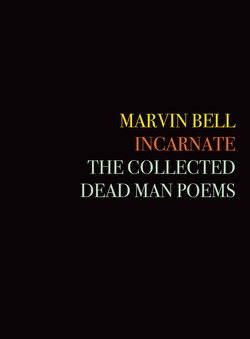Читать книгу Incarnate - Marvin Bell - Страница 8
ОглавлениеIncarnate: The Life of the Dead Man
David St. John
For more than twenty-five years the Dead Man has lived among us. For those readers who, from the very first, recognized that the Dead Man was also living within us, it has been astonishing to watch as Marvin Bell created poem by poem, book by book, one of the most powerful bodies of poetry (this collection, Incarnate, is the Dead Man’s body) in late twentieth-century and early twenty-first-century American literature. No voice in our poetry has spoken with more eloquence and wisdom about the daily spiritual, political, and psychological erosion in our lives; no poet has gathered our American experience with a more capacious tenderness—all the while naming and celebrating our persistent hopes and enduring human desires.
When the Dead Man embraces us in these pages, he also breathes into us faith in ourselves, a resurrected belief in our own ability to reckon—as he himself does with his wry humor and brilliant yet simple grace, illuminating the complexity of our lives as they have seemed to fragment around us. If we somehow feel we have lost our way along whatever paths we have traveled, the Dead Man arises as the lens through which we can see those tumbling pieces in the kaleidoscope—those jagged shards of personal experience or of historical or social wreckage—resolve into focus.
Throughout his career, Marvin Bell has always brought to his poetry a devotion to the lyric intensity of Dickinson as well as the broadly woven gestural expansiveness of Whitman. He has always echoed the performative genius of John Berryman alongside the postapocalyptic vaudeville of Samuel Beckett. In the Dead Man poems, as he rehearses the Zen admonition Live as if you were already dead, Bell employs a wicked humor as deeply American as Mark Twain’s (or Lenny Bruce’s) yet as intimate and local as Buster Keaton’s. He has always shared Wallace Stevens’s elegant philosophical impulses and his attention to the beauty of thought and of the mind in process. The steady political current in Bell’s poetry is as charged as Muriel Rukeyser’s, and his unapologetic antiwar evisceration of American policies is as radical as that ofany poet who came of age after World War II. His Bush-era poems are, in my view, the very best we have from that period of our history. It’s also time Bell’s deep love of William Carlos Williams (and the American vernacular) as well as his admiration for the Beat poets, especially Allen Ginsberg, be recognized as crucial elements in his poetry. From the beginning of his writing life, Bell understood the consolation of mystery in poetry and the lasting power and presence of art. Still, let’s be clear: Bell’s Dead Man only appears detached by virtue of our own definition of death; the Dead Man of these poems is ever of this dark world and its sorrows. To be alive, the Dead Man knows, is to die a little every day, even if—so unlike us—the Dead Man can no longer be betrayed by anything living.
Bell’s poetry has always exhibited a profoundly metaphysical intelligence. In the poems of the Dead Man, Bell has created a conversational and reflective philosophical music, establishing (as a formal choice) the poetic sentence as a measure of his poetic line. There is a declarative ease to this work that enables the poems to double back on themselves. The Dead Man poems are insistently bifocal and riddled with the dualities of experience. Perhaps it was Bell’s history as a photographer that in part motivated the distinctive “twin-lens reflex” modality of his Dead Man poems, yielding a fierce clarity from dual perspectives. For the Dead Man, paradox and duality constitute philosophical and moral clarity. Indeed, in one of Incarnate’s signature poems, Bell says of the Dead Man, “Like a camera, he squints to lengthen the depth of his field and bring the future into focus.”
The poems of the Dead Man are the living end. They are multivalent and protean, yet immediate and conversational. Even with the scent of the earth and its humus clinging to him (post-humus, as in: resurrected), the Dead Man is the oracle of the everyday. The Dead Man lives within the Taoist vision of the world of the ten thousand things. The Dead Man lives without us, of course, yet also within us.
Remarkable for its eclectic and culturally diverse vision, Incarnate embodies a vivid world of poetic reflection unlike anything else in American poetry.
